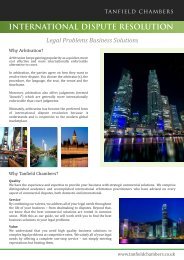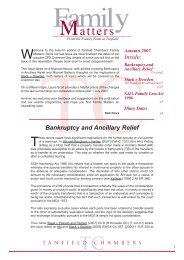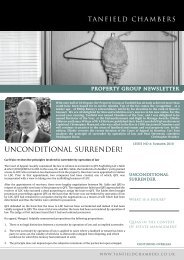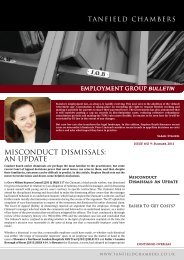Link to newsletter - Tanfield Chambers
Link to newsletter - Tanfield Chambers
Link to newsletter - Tanfield Chambers
Create successful ePaper yourself
Turn your PDF publications into a flip-book with our unique Google optimized e-Paper software.
TA N F I E L D C H A M B E R S<br />
EMPLOYMENT GROUP BULLETIN<br />
Welcome <strong>to</strong> the spring edition of the Employment Group Bulletin. First, Martina Murphy tackles<br />
the employment status of members of LLPs and controlling shareholders. Inside, you will also<br />
find Paul Stevenson’s timely thoughts on pay for staff kept at home by the wrong kind of snow.<br />
2009 was a busy year for employment practitioners in which a depressed economy seemed <strong>to</strong><br />
do little <strong>to</strong> diminish the appetite for litigation. Indeed, the ever-increasing number of claims<br />
contributed <strong>to</strong> serious listing difficulties in some Tribunals. It will be interesting <strong>to</strong> see if the<br />
recently announced 6-month pilot scheme of evening sittings will ease the pressure in 2010.<br />
Catriona MacLaren<br />
Member, shareholder or employee<br />
Small scale businesses, solici<strong>to</strong>rs’ firms, multi-billion pound hedge funds: a wide range of<br />
businesses have now chosen <strong>to</strong> become Limited Liability Partnerships (LLPs). However, the<br />
structure of LLPs, with membership often by those in senior roles in the business, has<br />
implications in employment law. Members may have rights not just as members, but also as<br />
employees. Similar questions arise when majority shareholders work for their companies. This<br />
article reviews the principles <strong>to</strong> be used by employment tribunals in determining the<br />
employment status of such individuals.<br />
Employment status of members of LLPs<br />
UK LLPs are governed by the Limited Liability Partnerships Act 2000. ‘Members’ of an LLP (often<br />
described as ‘partners’) are similar <strong>to</strong> shareholders and direc<strong>to</strong>rs of a limited company. Individual<br />
members are self-employed for income tax purposes on their share of the profits from the LLP (s.13 LLP<br />
Act 2000). Their basic employment position appears straightforward; a partner is not an employee<br />
(Cowell v Quilter Goodison [1989] IRLR 392, CA), essentially because the partnership itself does not<br />
have a separate or corporate identity.<br />
Problems have arisen, however, in relation <strong>to</strong> the employment status of non-equity partners and where<br />
there are complex arrangements. Burgess v O’Brien (1966) 1 ITR 164 emphasised that the relationship<br />
between a salaried partner and a partnership is a question of fact in each case. It appears that the usual<br />
assumption is that the relevant status is either partner or employee rather than neither.<br />
A recent Employment Appeal Tribunal (EAT) decision, Kovats v 1) TFO Management LLP and 2) The<br />
Family Group of Companies (UK) (2009) ICR 1140, has shed some light on the issue. Kovats (K), a<br />
partner of TFO, appealed against an employment tribunal's decision that he had not also been an<br />
employee. His role was <strong>to</strong> act as chief investment officer. He had signed a deed of accession, agreeing <strong>to</strong><br />
be bound by TFO's members' agreement and was entitled <strong>to</strong> a fixed annual membership distribution. At<br />
his own request he had opted <strong>to</strong> be paid gross and be responsible for his own tax and NI contributions.<br />
Following discontent with his performance a resolution was passed requiring him <strong>to</strong> retire from the<br />
partnership. K brought a claim for unfair dismissal. The tribunal dismissed the claim on the ground that<br />
it did not have jurisdiction because he had not been an employee. In doing so, it <strong>to</strong>ok as its starting point<br />
the LLP Act 2000 s.4(4) - “a member of a limited liability partnership shall not be regarded for any purpose<br />
as employed by the limited liability partnership unless, if he and the other members were partners in a<br />
ISSUE NO 6: Winter 2010<br />
Member, shareholder<br />
or employee<br />
SNOW PROBLEMS<br />
continued overleaf<br />
W W W. T A N F I E L D C H A M B E R S . C O . U K
Martina Murphy<br />
Martina acts on behalf of NHS Trusts, the<br />
Metropolitan Police Authority, and local<br />
authorities, and is on Thompsons Solici<strong>to</strong>rs'<br />
approved panel of Counsel. Martina is also<br />
on the Employment Committee for the<br />
Federation of Small Businesses.<br />
Recently, in November 2009, she was instructed on behalf of a FTSE<br />
250 Company in its application for a High Court injunction which<br />
involved issues of restrictive covenants and protection of<br />
confidential information.<br />
When she's not working, Martina is a keen runner and has<br />
completed the London Marathon. She can often be found at a<br />
ridiculously early hour running around Greenwich Park with the<br />
Greenwich Runners.<br />
partnership, he would be regarded for that purpose as employed by the<br />
partnership.”<br />
The EAT dismissed the appeal, upholding the ET’s decision. In enacting<br />
s.4(4), Parliament had expressly provided that the legal test for<br />
determining whether a person was a partner or an employee of a<br />
partnership (the test under Partnership Act 1890) also determined<br />
whether a member of an LLP was employed by it for the purposes of the<br />
Employment Rights Act 1996. In the context of partnership, the tribunal<br />
had <strong>to</strong> decide first whether a person fell within the category of<br />
partnership or employment. If it decided that the person was not a<br />
partner, it did not follow that the person was necessarily an employee;<br />
the usual common law tests would still need <strong>to</strong> be applied, as the person<br />
might in fact be self-employed.<br />
The EAT decided that the tribunal had been correct <strong>to</strong> conclude that the<br />
words "any purpose" and "that purpose" in s.4(4) had <strong>to</strong> be regarded as<br />
a reference <strong>to</strong> K's role as chief investment officer, and that it had <strong>to</strong> ask<br />
itself whether, if the LLP was a normal partnership under the Partnership<br />
Act 1890, K's role as chief investment officer would be regarded as<br />
employment. The tribunal had been entitled, on the evidence before it, <strong>to</strong><br />
conclude that K was not an employee of TFO. It had applied the correct<br />
legal test and had made findings of fact, which it was entitled <strong>to</strong> make.<br />
The employee status of a controlling shareholder<br />
In Secretary of State for Business, Enterprise and Regula<strong>to</strong>ry<br />
Reform (BERR) v Neufeld & Anor [2009] IRLR 475 CA the Court of<br />
Appeal has given guidance on the approach employment tribunals<br />
should take in considering whether a majority shareholder should be<br />
regarded as an employee.<br />
The case concerned the common situation of a majority shareholder<br />
and/or direc<strong>to</strong>r of an insolvent company claiming <strong>to</strong> be an ‘employee’ in<br />
order <strong>to</strong> claim certain unpaid amounts from the Secretary of State under<br />
the Employment Rights Act 1996 s.182 Part XII (‘employee rights on<br />
insolvency of the employer’). On the facts of these joined cases, direc<strong>to</strong>rs<br />
with 90% (Neufeld) and 100% (Howe) shareholdings respectively in<br />
their companies were employees.<br />
Although the CA stated that whether or not such a shareholder/direc<strong>to</strong>r<br />
is an employee of the company is a question of fact, they gave some<br />
helpful guidance. In any such case there are likely <strong>to</strong> be two issues,<br />
although in practice the evidence relevant <strong>to</strong> their resolution will be<br />
likely <strong>to</strong> overlap.<br />
a. The first and logically preliminary issue will be whether the putative<br />
contract is a genuine contract or a sham.<br />
b. The second issue, assuming there is a genuine contract, is whether it<br />
amounted <strong>to</strong> a contract of employment (as opposed <strong>to</strong> eg a contract<br />
for services) at the relevant time.<br />
The CA made it clear, that, in particular, it will be no answer <strong>to</strong> a<br />
majority/controlling shareholder’s claim <strong>to</strong> be an employee <strong>to</strong> argue that<br />
he cannot be an employee in law because:<br />
(i) The extent of his control of the company means that the control<br />
condition of a contract of employment cannot be satisfied; or<br />
(ii) He has practical control over his own destiny and cannot be<br />
dismissed from his employment except with his consent.<br />
Further, the CA observed that an owner acting as an owner, as is<br />
inevitable in small companies for example, can also be an employee.<br />
TC<br />
Snow Problems<br />
Although what has been arguably the coldest snap in a<br />
generation has passed, its effects will be long felt. The popular<br />
press reported that millions were <strong>to</strong>ld that they would lose a<br />
day’s pay if they did not get in<strong>to</strong> work while Sky News announced<br />
that one in ten firms said that their entire workforce had been<br />
absent at times during the worst affected period. This article<br />
considers the issues which are likely <strong>to</strong> arise during episodes of<br />
extreme weather and suggests a guideline approach.<br />
Starting point<br />
our authors<br />
The starting point will always be the contract of employment or<br />
written particulars of employment. If there is a clearly defined policy<br />
<strong>to</strong> deal with inclement weather then that should be the end of the<br />
matter. This, however, will rarely be the case.<br />
Disciplinary sanction<br />
Theoretically, an employer might want <strong>to</strong> take disciplinary steps<br />
against an employee who has failed <strong>to</strong> turn up for work if, in their<br />
opinion, the employee was able <strong>to</strong> work but had chosen not <strong>to</strong>.<br />
As part of any disciplinary procedure an employer would be required<br />
<strong>to</strong> inquire in<strong>to</strong> the known circumstances of each absence. This would<br />
be essential given that consistency in treatment is one of the<br />
hallmarks of a fair disciplinary procedure. Given the extreme weather<br />
experienced almost universally this year it would be difficult for an<br />
employer <strong>to</strong> investigate the circumstances of each case and, therefore,<br />
<strong>to</strong> ensure a consistent approach.<br />
It would almost always be unfair <strong>to</strong> dismiss an employee for failing <strong>to</strong><br />
turn up <strong>to</strong> work where hampered by snow, particularly where the<br />
employer was aware that the employee would not be able <strong>to</strong> attend.<br />
Deductions from wages<br />
Anecdotal evidence suggests that some employers have proposed <strong>to</strong><br />
make, or have made, deductions from wages. By way of the ERA 1996,<br />
ss. 13(1) and 15(1) no deductions may be made from a worker’s<br />
wages unless:<br />
i. It is required or permitted by a statu<strong>to</strong>ry or contractual provision;<br />
or<br />
ii. The worker in question has given his/her prior consent <strong>to</strong> the<br />
deduction.<br />
continued on back page<br />
W W W. TA N F I E L D C H A M B E R S . C O . U K
Paul Stevenson<br />
Paul Stevenson has a thriving and diverse<br />
employment practice and frequently appears<br />
in employment tribunals at every stage from<br />
review hearings and pre-hearing reviews<br />
through <strong>to</strong> final hearings. Paul has wideranging<br />
experience of advising and drafting<br />
particulars of complaint and resistance in all<br />
manner of employment claims from unfair dismissal <strong>to</strong> age and<br />
disability discrimination. He has also advised on compromise<br />
agreements and restrictive covenants. Recent experience includes<br />
providing advice <strong>to</strong> and appearing for both Claimants and<br />
Respondents in redundancy claims where TUPE and the Working Time<br />
Regulations were engaged. When away from his desk, Paul is the chair<br />
of a charity working in west Africa and provides advice and assistance<br />
<strong>to</strong> a student publishing company in Oxford. He enjoys good food,<br />
pho<strong>to</strong>graphy, politics, reading and travel.<br />
These provisions cover any sums which a worker would normally<br />
expect <strong>to</strong> be paid in connection with his/her employment and where<br />
the <strong>to</strong>tal amount of wages paid on any occasion is less than the <strong>to</strong>tal<br />
amount properly payable on that occasion. Where a worker is faced<br />
with such a deduction it is extremely important that they have<br />
recourse <strong>to</strong> their contract of employment in order <strong>to</strong> see what it<br />
permits.<br />
To be entitled <strong>to</strong> pay, the employee must show that he/she has<br />
worked or is willing <strong>to</strong> work for it: the governing authority is Miles v<br />
Wakefield Metropolitan District Council [1987] I.C.R. 368. Albeit<br />
obiter, Lord Brightman expressly differentiated between the facts of<br />
that case and what he referred <strong>to</strong> as “a failure <strong>to</strong> work, or work<br />
efficiently, as a result of illness or other unavoidable impediment, where<br />
special considerations apply”. He plainly did not envisage the<br />
nationwide inability <strong>to</strong> attend work which we saw earlier this year. It<br />
will be a question of fact in any case whether an employee was willing<br />
<strong>to</strong> work. Given, however, that many parts of the country were subject<br />
<strong>to</strong> warnings not <strong>to</strong> travel if at all possible employers should be aware<br />
that it would be difficult <strong>to</strong> argue that a snowbound employee was<br />
unwilling <strong>to</strong> work.<br />
If an employer attempts <strong>to</strong> make a deduction purportedly in<br />
accordance with a contractual provision, the terms of the contract<br />
must have been shown <strong>to</strong> the worker or, if not made in writing, its<br />
effect must have been notified <strong>to</strong> the worker before the deduction is<br />
made: see the ERA 1996, ss. 13(2), 15(2).<br />
An employee faced with a deduction from wage should seek speedy<br />
legal advice because much will depend on the factual circumstances of<br />
their employment contract. The complaint ought <strong>to</strong> be presented<br />
within three months beginning with the date of the deduction of<br />
which complaint is made.<br />
Childcare<br />
In a related concern, the closure of thousands of schools gave many<br />
parents unexpected daytime childcare concerns. So what approach<br />
can an employee expect<br />
As a general rule, employees have the right <strong>to</strong> take reasonable unpaid<br />
leave <strong>to</strong> deal with unexpected disruption or termination of<br />
arrangements for the care of a dependant: ERA 1996, s. 57A(1).<br />
Statu<strong>to</strong>ry protection does not, however, compel an employer <strong>to</strong> give<br />
time off <strong>to</strong> allow an employee personally <strong>to</strong> provide care beyond the<br />
reasonable amount necessary <strong>to</strong> deal with the immediate crisis. There<br />
would, however, be an argument that where a school closure is not<br />
announced until the last minute an employee could seek statu<strong>to</strong>ry<br />
protection for taking the full day off. The amount of time which is<br />
reasonable depends on all the circumstances and an employee should<br />
inform the employer as soon as reasonably practicable and state how<br />
long he/she expects <strong>to</strong> be absent.<br />
A guideline approach<br />
Employers should develop a clear extreme weather policy which sets<br />
out, in advance, what is expected of both parties. The overriding<br />
concern for an employer should be <strong>to</strong> ensure that a consistent<br />
practice is applied across their workforce.<br />
Employers should take a balanced approach and should bear in mind<br />
that they have a duty of care <strong>to</strong> their employees <strong>to</strong> see that employees<br />
are not subjected <strong>to</strong> any unnecessary risk of injury and should<br />
consider the possible liability attached <strong>to</strong> forcing an employee <strong>to</strong><br />
travel when it would be unsafe.<br />
Any policy should emphasize that employees have a contractual duty<br />
<strong>to</strong> attend work and that, where possible, employees should take all<br />
reasonable steps <strong>to</strong> attend work and should keep in regular contact<br />
with their employer. Alongside encouraging flexible/home working<br />
where possible, employers should foster a culture of advance<br />
planning, particularly in matters relating <strong>to</strong> child care and should<br />
consider options such as reasonable unpaid leave <strong>to</strong> cover child care.<br />
The policy should make clear provision for early closure of a<br />
workplace where appropriate. If employees who cannot make it <strong>to</strong><br />
work will be required <strong>to</strong> take a day’s leave as part of their holiday<br />
entitlement this should be unambiguous. A timely reminder of a<br />
definite policy such as this whenever snow falls might mean that<br />
employees tempted <strong>to</strong> be ‘unable’ <strong>to</strong> travel <strong>to</strong> work are suddenly able<br />
<strong>to</strong> make it.<br />
PAUL STEVENSON<br />
W W W. TA N F I E L D C H A M B E R S . C O . U K
Kevin Moore<br />
Kevin Moore has been a barristers’ clerk<br />
for 35 years and joined <strong>Chambers</strong> in 1999<br />
having previously been senior clerk in a<br />
highly regarded commercial set. He is a<br />
member of the Institute of Barristers’<br />
Clerks.<br />
Kevin is responsible for the overall clerking of <strong>Chambers</strong> and is<br />
happy <strong>to</strong> discuss any aspect of the service with clients. His flexible<br />
and pragmatic approach <strong>to</strong> the job is appreciated by solici<strong>to</strong>rs who<br />
instruct <strong>Chambers</strong> and has been recognised in the Legal 500.<br />
Kevin is married with 3 grown up children who still manage <strong>to</strong> be<br />
a drain on resources. In his spare time Kevin is a long suffering<br />
supporter of West Ham United FC.<br />
David Wright<br />
David has been clerking for 10 years in<br />
leading commercial and employment sets.<br />
He qualified as a barristers’ clerk in 2002<br />
and is a member of the Institute of<br />
Barristers’ Clerks.<br />
In 2007, David joined <strong>Tanfield</strong> <strong>Chambers</strong> as<br />
Principal Employment and Commercial Clerk where he has put his<br />
wealth of experience <strong>to</strong> good use. His combination of hard-work,<br />
organisation and reliability has proved a real asset <strong>to</strong> <strong>Chambers</strong>.<br />
When agreeing fees, David always strives <strong>to</strong> remain client focussed<br />
and fair.<br />
In his spare time David studies Hapkido (a Korean martial art) and<br />
enjoys playing football and badmin<strong>to</strong>n. He is also a bit of a film buff.<br />
Rimer LJ’s Judgment in Neufeld approved Elias P’s guidance in para 98 of<br />
Clark v Clark Construction Initiatives [2008] IRLR 364 EAT on<br />
deciding whether a majority shareholder should have employment<br />
status, with two qualifications:<br />
(1) The onus is on the party denying a contract; where an individual has<br />
paid an employee's tax and NI, prima facie he is entitled <strong>to</strong> an employee's<br />
rights. Neufeld added that guideline (1) should not be read as<br />
constituting a formal reversal of the burden of proof on <strong>to</strong> the party<br />
denying employment status. It may still be necessary for the putative<br />
employee <strong>to</strong> do more than produce documentation <strong>to</strong> satisfy the tribunal.<br />
(2) The mere fact of majority shareholding (or de fac<strong>to</strong> control) does not<br />
in itself prevent a contract arising.<br />
(3) Similarly, entrepreneur status does not in itself prevent a contract<br />
arising.<br />
(4) If the parties conduct themselves according <strong>to</strong> the contract (eg as <strong>to</strong><br />
hours and holidays), that is a strong pointer <strong>to</strong>wards employment.<br />
(5) Conversely, if their conduct is inconsistent with (or not governed by)<br />
the contract, that is a strong pointer against employment.<br />
(6) The assertion that there is a genuine contract will be undermined if<br />
there is nothing in writing. Neufeld added that guideline (6) may be<br />
expressed <strong>to</strong>o negatively. Lack of writing may be an important<br />
consideration but if the parties' conduct tends <strong>to</strong> show a true contract of<br />
employment 'we would not wish tribunals <strong>to</strong> seize <strong>to</strong>o readily on the<br />
absence of a written agreement <strong>to</strong> justify a rejection of the claim'.<br />
(7) The taking of loans from the company (or the shareholder<br />
guaranteeing its debts) is not intrinsically inconsistent with employment.<br />
(8) Although majority shareholding and/or control will always be<br />
relevant and may be decisive, that fact alone should not justify a finding<br />
of no employment.<br />
Recently, the EAT applied Neufeld in Ashby v Monterry Designs Ltd<br />
(2009) 18/12/2009 holding that a tribunal had misdirected itself when<br />
deciding that a shareholder in a company had not been its employee. The<br />
tribunal had not had the benefit of Neufeld when reaching its decision<br />
and had placed <strong>to</strong>o much weight upon the question of control in<br />
determining whether there was a contract of employment.<br />
Practical effect<br />
The CA were informed in Neufeld that in “2008 there were some 12,000<br />
claims by direc<strong>to</strong>rs on the National Insurance Fund, of which some 600 had<br />
gone or were expected <strong>to</strong> go <strong>to</strong> employment tribunals”. The CA assumed<br />
that a considerable number were direc<strong>to</strong>rs who were also controlling<br />
shareholders.<br />
A claim on the NI fund could add up <strong>to</strong> £21,280 assuming that the<br />
maximum redundancy, wages, holiday pay and compensa<strong>to</strong>ry notice pay<br />
were all claimed, and the limit on weekly pay is £380 (as it is from 1<br />
Oc<strong>to</strong>ber 2009 under s.189). In the author’s view, such potential claims<br />
are likely <strong>to</strong> be worth pursuing even for high net worth potential<br />
claimants, in the current financial climate.<br />
MARTINA MURPHY<br />
For further information or <strong>to</strong> instruct a barrister, please contact<br />
David Wright, Employment Clerk or Kevin Moore, Senior<br />
Clerk, on 0207 421 5300 or clerks@tanfieldchambers.co.uk<br />
employment barristers:<br />
David Berkley QC (1979)<br />
Andrew Thompson* (1969)<br />
Paul Staddon (1976)<br />
David Daly (1979)<br />
Simon Cheves (1980)<br />
Robin Howard (1986)<br />
Chris<strong>to</strong>pher Bamford (1987)<br />
Stephen Heath (1992)<br />
Catriona MacLaren (1993)<br />
Peter Linstead (1994)<br />
Martina Murphy (1998)<br />
Andrew Sheftel (2004)<br />
Louise Mankau (2005)<br />
Paul Stevenson (2006)<br />
Gemma de Cordova (2006)<br />
Cecily Crampin (2008)<br />
* Joint Edi<strong>to</strong>r of Harvey on Industrial Relations and Employment Law<br />
<strong>Tanfield</strong> <strong>Chambers</strong>’ dedicated conference facilities are readily accessible<br />
by the mobility-impaired. Please contact the clerks <strong>to</strong> agree fees in<br />
advance, whether on a fixed or hourly rate. Feedback on our service is<br />
welcomed and should be directed <strong>to</strong> the Senior Clerk, Kevin Moore. A<br />
copy of <strong>Chambers</strong> Complaints’ Procedure is available on our website or<br />
on request.<br />
To contact us: T: +44 (0) 20 7421 5300, F: +44 (0) 20 7421 5333, DX: 46 London Chancery Lane, E: clerks@tanfieldchambers.co.uk<br />
Address: <strong>Tanfield</strong> <strong>Chambers</strong>, 2-5 Warwick Court, London, WC1R 5DJ


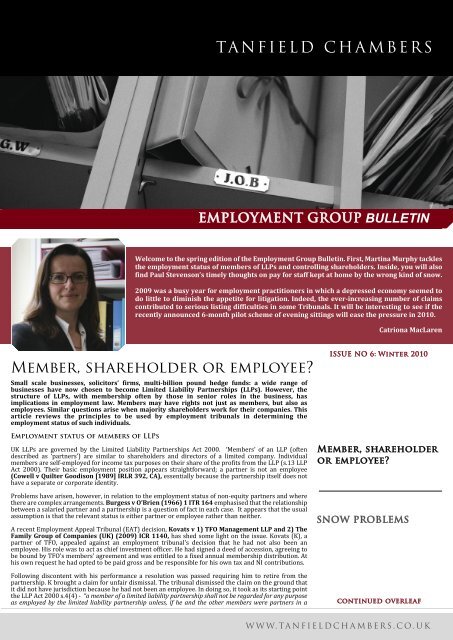
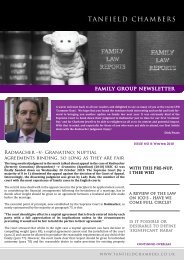


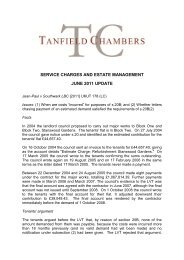
![Re Clarise Properties Ltd [2012] UKUT 4 (LC) - Tanfield Chambers](https://img.yumpu.com/36301708/1/190x245/re-clarise-properties-ltd-2012-ukut-4-lc-tanfield-chambers.jpg?quality=85)


